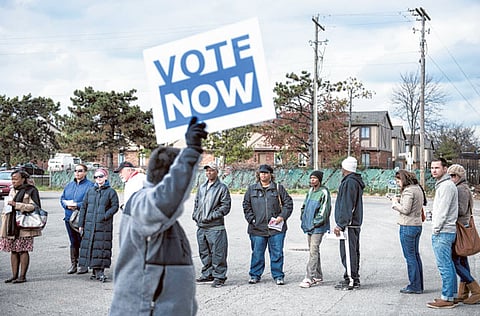A city left off the campaign map
The only political sign is a faded sticker saying ‘Don’t have a job?’

Gary, Indiana: When Michael Jackson was just five years old, he joined the family’s singing act, the Jackson Five, here in their small clapboard home.
And judging by the way the city is now, you can see why he learnt his caricature moonwalk move — do anything to get out of here.
There’s 50 kilometres of brown lands and industrial street scape between Chicago and Gary — it might as well be 50,000 as the worlds are so far apart.
There may be an election here, but both Republican and Democratic campaigns have left the city off the map. There’s no campaign signs, no billboards, no hustling for votes.
Like everyone else, Mitt Romney and Barack Obama have given up on Gary.
“Why you come here?” an excitable black man on Buchanan Street asks.
“Lordy, ain’t seen no visitors here in a long time, man.”
And certainly not a white face either here, for a long time.
At its height, Gary was once a thriving city where 200,000 lived and many laboured at the US steel plant — the largest employer. It closed, and so did Gary. Officially 80,000 still call it home — it might as well be 8,000.
Right downtown — if the boarded up buildings and abandoned homes constitute an actual downtown — a total of five people venture out — a young teenage mum with two toddlers and another on the way, her latest diamond-eared love interest, and the agitated man who’s willing to talk — but barely.
“You can live anywhere you want here — there’s lots of houses to choose from. All free. They’s been boarded up for years.
“Election? You kidding me, man. Ain’t no election here. No one cares about Gary.”
Clarence says he’s 37. If he said 57, you could believe him too.
And he ain’t ever voted either during those 37 years.
Nor has he ever had a job.
Right now, he’s out on parole after a stretch for domestic battery.
He’s only staying because his parole conditions don’t allow him to leave, like the other 100,000 over the past decade.
“They all move away, to Chicago or Indianapolis, anywhere but here.”
If movie makers need a post-apocalyptic street scape, this is the place. The steel works are mostly gone, torn down, sold for scrap as cheaper hubs like South Korea were able to produce it cheaper.
The US Bridge Company still operates a plant on the north side of Interstate 90, but it too has seen better days.
“Yeah, when the Good Lord called MJ home, there were a few folks that came to see where he was from. A lotta people is from Gary but they never stay.
“There’s a park named after him off Third Street and the home’s over there. But you be careful now, you hear. Ain’t many visitors like you go that way.”
Those same movie makers also have a perfect scene for any gangsta movie — youths in baseball caps and baggy jackets sit on porches watching every car drive by — and a strange one gets strained stares, almost daring you to roll down the window and have a pop.
Last year, according to Federal Bureau of investigation statistics, Gary had the highest murder rate per capita for a city its size anywhere in the US.
In 2010, there were 54 murders here, 50 in 2009, 40 in 2008 — and don’t forget that there’s fewer people living here each year.
Whole sides of streets have houses boarded up — gratified, broken windows, roofs started to bend and cave, asphalt tiles curling and lifting, gutters falling, cars left half junked.
Michael and his brothers may have been the defining sounds of Motown back in the day, now it’s hard-core rap booming from an impromptu party on one porch around a barbeque and a case of beer.
More stares at the stranger passing down their turf.
If MJ was the king of pop, his first palace in this neverland is a small white humble home. It’s the only one on Jackson Avenue that’s neat and has a bunch of wilting flowers on the front. But don’t be fooled, the city fathers in Gary went a little overboard calling this tired alley an avenue. And it’s not a place to linger either, not amongst the weedy gardens and paint-peeled properties and hardened stares.
The only political sign in this city — a faded bumper sticker on a Chevrolet van sitting on a flat white-walled tyre: “Don’t have a job?
Eat your import! United Auto Workers.”
A job? They hardly have a city. No wonder Obama and Romney kept going on the Interstate.
Sign up for the Daily Briefing
Get the latest news and updates straight to your inbox



